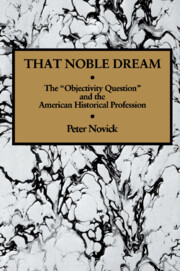Book contents
12 - An autonomous profession
Published online by Cambridge University Press: 29 March 2011
Summary
In previous chapters we have seen how partially and incompletely historians had succeeded in meeting all the criteria of an academic profession, criteria drawn from models of the free professions and from scientific disciplines. Insofar as the concept “profession” remains an ideal type, it will by definition forever be imperfectly realized, but the postwar years saw dramatic progress in fulfilling the old program of professionalizing historical studies. Whereas in the interwar years historians had only indifferent success in achieving such key elements of academic professionalism as autonomy from lay control, heightened status, universalistic criteria of evaluation, and a dominant research ethos, the postwar years saw substantial advances in all these areas, producing a sense of self-confidence and self-satisfaction which clearly distinguishes this period from those which preceded and which followed. The doubts and discouragements which had characterized the interwar years, and which, as we have seen, had consequences for attitudes toward objectivity, gave way to an increasing sense that American professional historical scholarship was a vital, growing, and prospering venture.
John Higham, whose 1965 survey of the historical profession reflected contemporary mainstream opinion, wrote that “the depressing sense of a loss of status, which was so widespread in the first quarter of the twentieth century, has been dramatically reversed since World War II.”
Instead of looking backward to the esteem attached to “character” and “culture” among the genteel classes of the late nineteenth century, college professors have become conscious of their rising importance as a relatively autonomous group on the national scene. […]
Information
- Type
- Chapter
- Information
- That Noble DreamThe 'Objectivity Question' and the American Historical Profession, pp. 361 - 412Publisher: Cambridge University PressPrint publication year: 1988
Accessibility standard: Unknown
Why this information is here
This section outlines the accessibility features of this content - including support for screen readers, full keyboard navigation and high-contrast display options. This may not be relevant for you.Accessibility Information
- 1
- Cited by
